Asus PG279Q ROG Swift 27-inch 165Hz Gaming Monitor Review
We have the highly-anticipated ROG Swift PG279Q in the lab today. It’s a 27-inch IPS-type panel with QHD resolution, G-Sync, ULMB and an unprecedented 165Hz max refresh rate.
Why you can trust Tom's Hardware
Viewing Angles, Uniformity, Response And Lag
To learn how we measure screen uniformity, please click here.
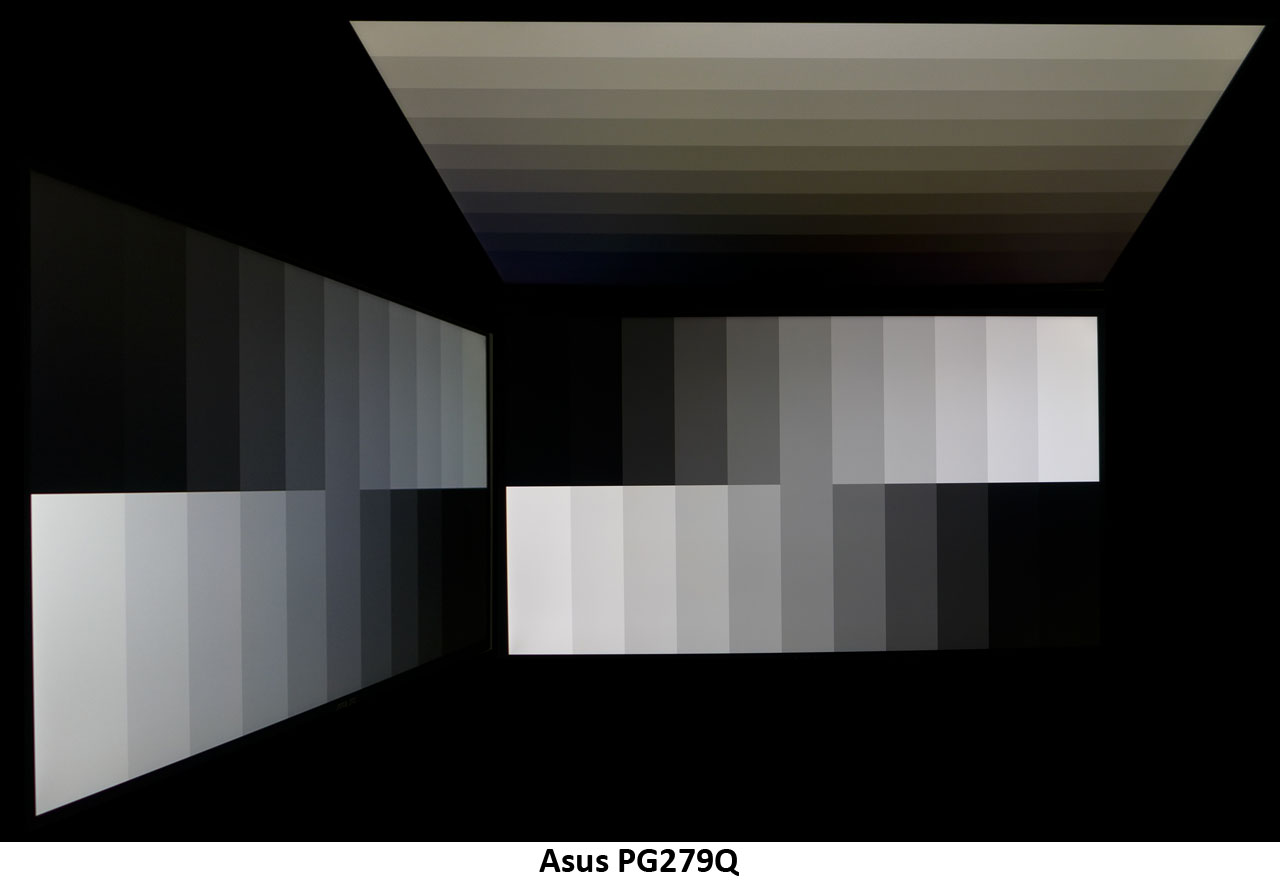
AHVA panels are simply another flavor of IPS but they do offer better off-axis viewing to the sides than typical monitors. The only effect there is a slight brightness falloff and a barely-visible blue tint. From the top things turn decidedly green but there is no loss of detail. In our photo you can see very little difference between the zero and 10 percent steps. That's due to the PG279Q's gamma error, not its pixel structure.
Screen Uniformity: Luminance
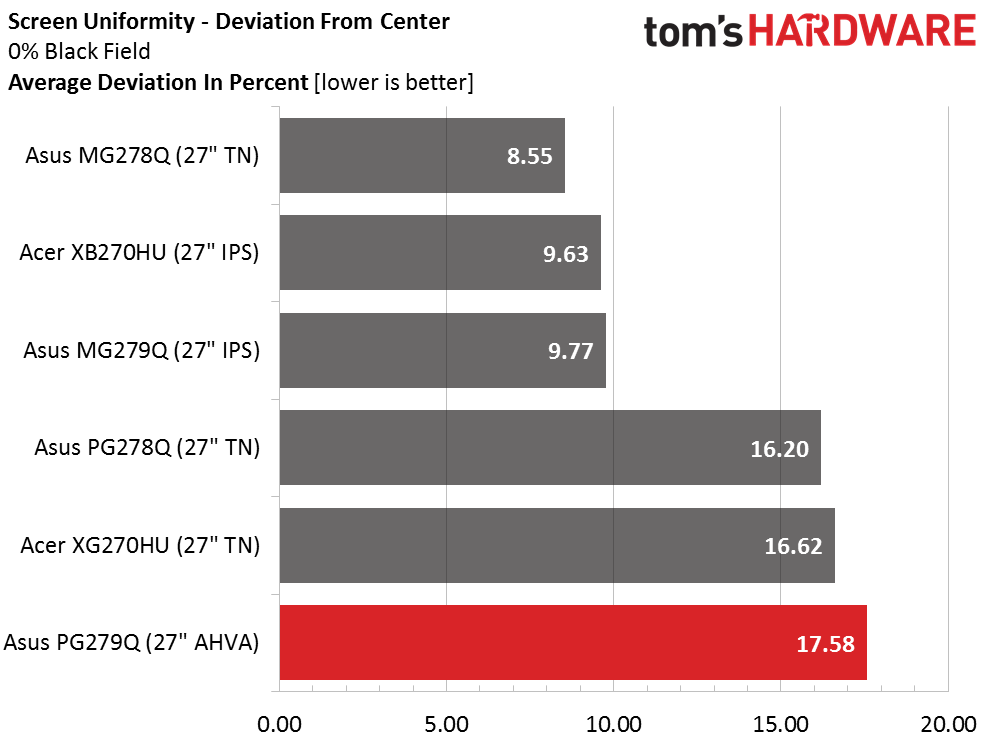
We've reviewed a few displays that have little to no air gap between the anti-glare and LC layers. While image clarity is enhanced by this approach, it makes the monitor more prone to light-bleed. The 17.58 percent result is mainly caused by a hotspot in our sample's lower right corner. If not for that issue, it would have measured under 10 percent.
Here's the white field measurement.
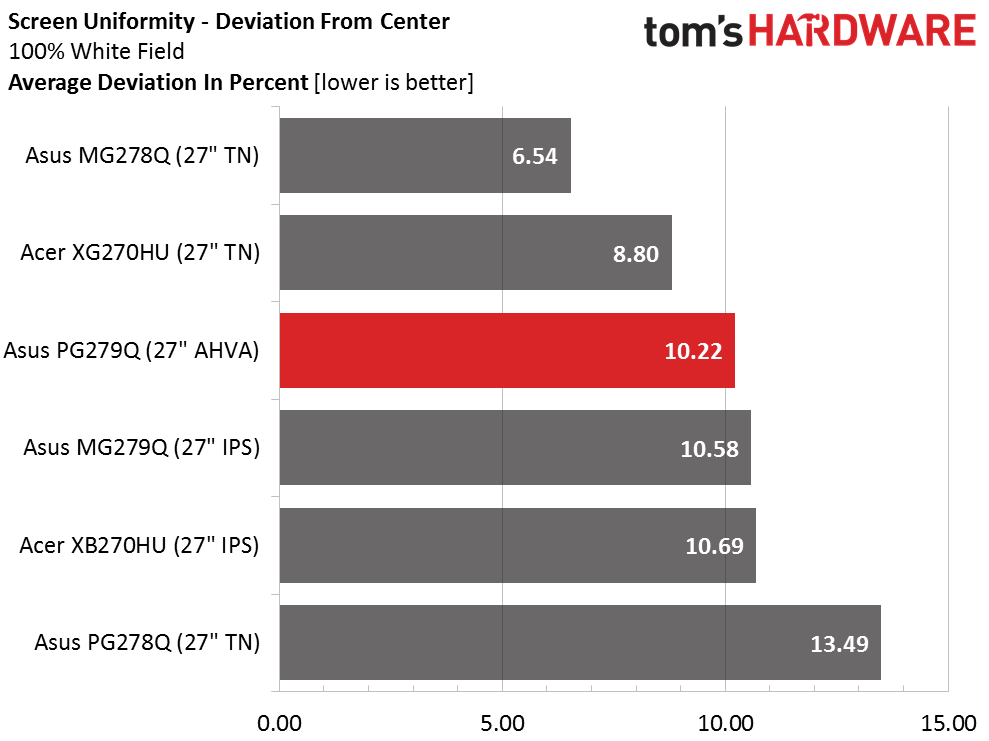
White-field uniformity is not affected by the tight panel layers. 10.22 percent puts the ROG Swift on par with most monitors we review. At this level you won't be able to see any problems in anything but the darkest content.
Screen Uniformity: Color
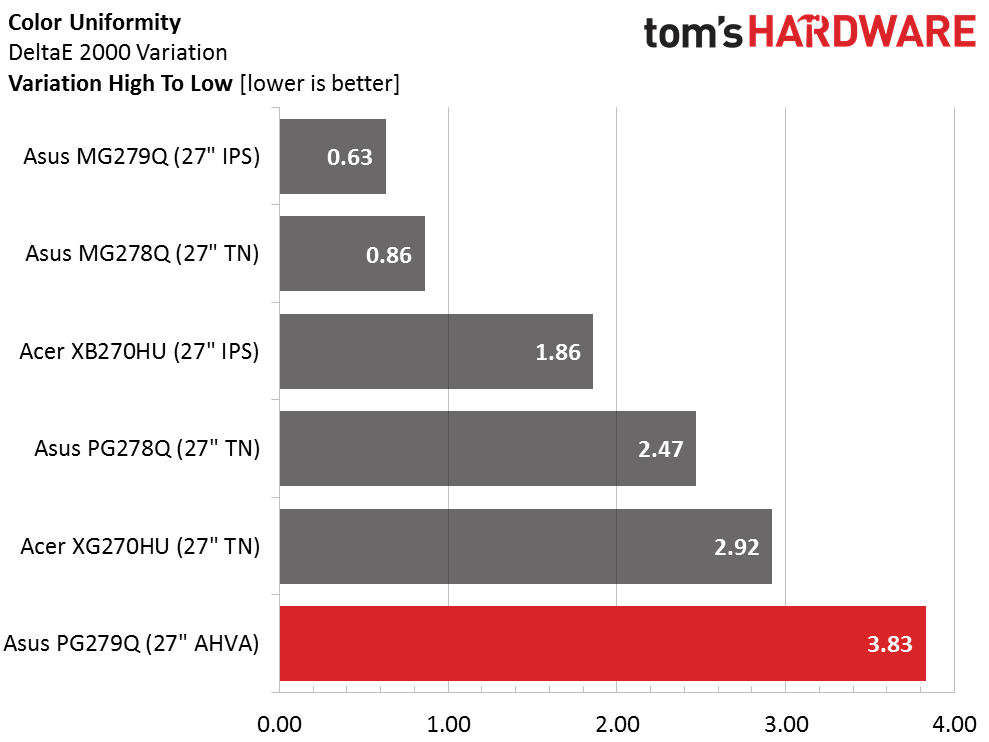
The lower right zone is the culprit again in our color uniformity test. We could see a minor blue tint in that area in our 80 percent white field pattern. It's a very slight error and you won't see it in actual content. But the other premium gaming displays here measure somewhat better.
Pixel Response And Input Lag
Please click here to read up on our pixel response and input lag testing procedures.
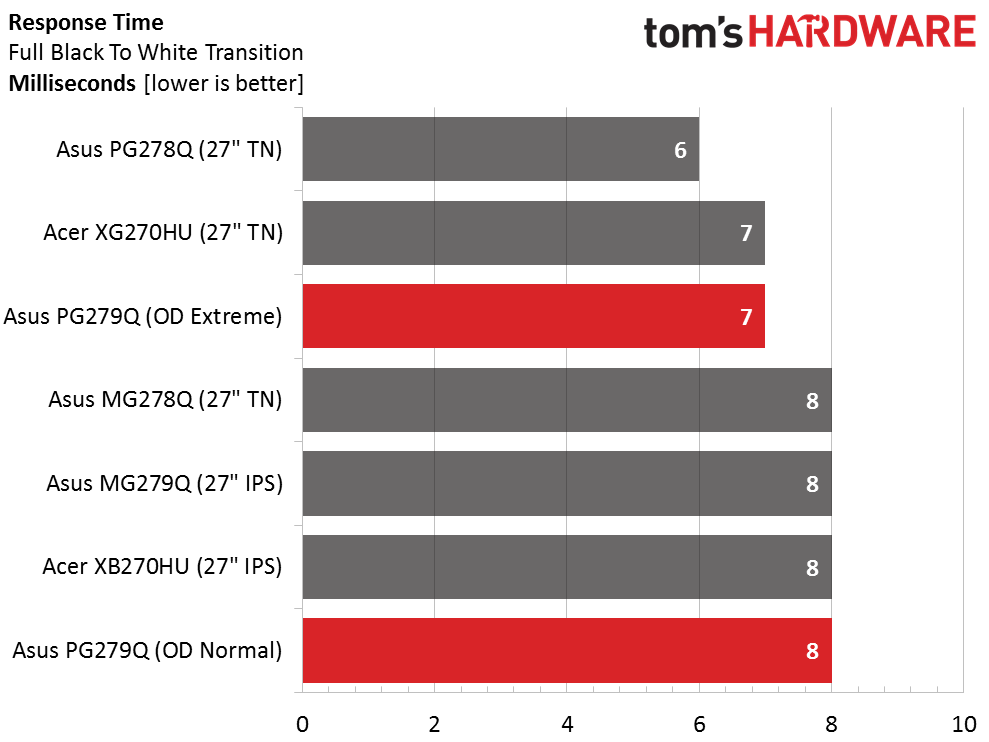
We suspect many of you have skipped to this page before reading the rest of the review. 165Hz is, after all, the reason to buy a PG279Q. In terms of panel response it doesn't make a difference compared to a 144Hz display. And TN is slightly quicker overall. Here we're also showing the effect of Asus' Overdrive option. Setting it to Extreme does reduce draw time by one millisecond but the extra ghosting it introduces isn't worth it in our opinion. Leaving it on Normal improves motion resolution without such artifacts.
Here are the lag results.
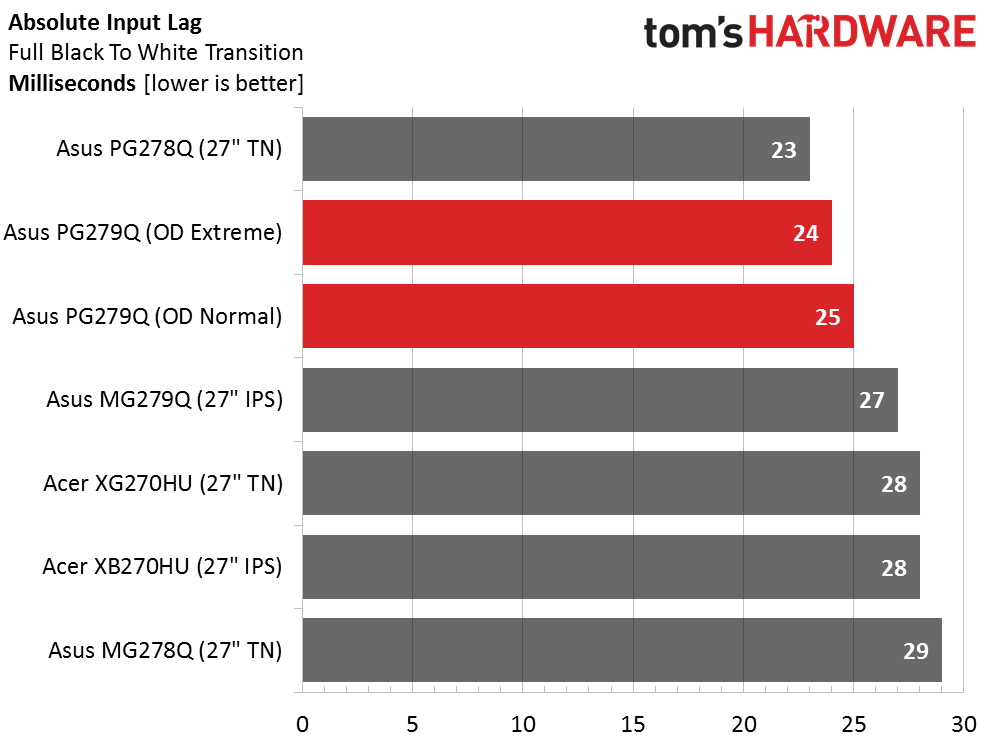
The extra Hertz don't seem to affect input lag either. That's probably a function of the PG279Q's IPS technology. Realistically though, no one will be able to perceive a difference of six milliseconds in even the fastest gameplay. The main attraction here is motion quality and resolution and this new Asus has plenty of both.
G-Sync, ULMB And 165Hz
On page three we detailed the PG279Q's different operating modes. If one were to use the ROG Swift with an AMD video card (extremely unlikely), they could still enjoy its Normal mode over DisplayPort with a 165Hz max refresh rate. Does this provide the best quality in fast-paced games? The answer is pretty much yes. If you can drive QHD resolutions up to or over 100fps, the effects of tearing are nearly non-existent. As we've said in our FreeSync monitor reviews, the real difference happens between 40 and 80fps.
We played our go-to titles Far Cry 4, Battlefield 4 and Tomb Raider to assess the real-world impact of G-Sync, fast refresh and ULMB. First off, ULMB quickly became something we would not choose to use. Not only does it reduce light output and contrast, it prevents framerates from exceeding 120Hz. While this by itself isn't a big deal, the loss of G-Sync meant we saw tearing in all games when the action became intense. By upping detail to max levels, it wasn't too difficult to bring our Titan X graphics board down below 80fps. At that point, blur-reduction couldn't hide the other artifacts we saw.
Returning to G-Sync mode, we were able to set the Overclock slider to 165Hz and restore all the monitor's brightness. While we never saw 165fps in the GamePlus rate indicator, we had no trouble maintaining values north of 100. This is where it truly feels like you're interacting with a film. Motion is so smooth and life-like that you find yourself playing far longer than planned. A monitor like this with a suitably-powerful gaming PC can be a tremendously fun time-waster.
Current page: Viewing Angles, Uniformity, Response And Lag
Prev Page Color Gamut And Performance Next Page ConclusionStay On the Cutting Edge: Get the Tom's Hardware Newsletter
Get Tom's Hardware's best news and in-depth reviews, straight to your inbox.

Christian Eberle is a Contributing Editor for Tom's Hardware US. He's a veteran reviewer of A/V equipment, specializing in monitors. Christian began his obsession with tech when he built his first PC in 1991, a 286 running DOS 3.0 at a blazing 12MHz. In 2006, he undertook training from the Imaging Science Foundation in video calibration and testing and thus started a passion for precise imaging that persists to this day. He is also a professional musician with a degree from the New England Conservatory as a classical bassoonist which he used to good effect as a performer with the West Point Army Band from 1987 to 2013. He enjoys watching movies and listening to high-end audio in his custom-built home theater and can be seen riding trails near his home on a race-ready ICE VTX recumbent trike. Christian enjoys the endless summer in Florida where he lives with his wife and Chihuahua and plays with orchestras around the state.
-
TechyInAZ That is one sweet monitor! I can't imagine how good the OLED versions will be. : )Reply
It's interesting to note that this monitor is actually more demanding than a 4k 60hz monitor. Even though this is only a 2k monitor, it actually has nearly 3x the Hz compared to it's 4k counterparts, making it not supprising that you need at least dual GTX 980tis/Titan Xes to run everything at good settings. -
Epsilon_0EVP This isn't the first 165Hz+ monitor. Plenty of CRT's could achieve around 200Hz at low resolutions, and that was over 10 years ago.Reply -
Uri___Pisarev I don't know, i went from a 32 inch TV to a 34 inch ultra wide Dell. I feel like i can still use a bigger monitor, anything sub 30 is just too small.Reply -
ubercake What I like about these G-sync monitors is you don't have to use an SLI setup to push maximum framerates to minimize perceivable tearing. Ever since the GTX 980 and the Asus PG278Q, all I've needed for great smooth video performance is a G-sync monitor and a single video card. I don't need 165Hz/165fps. I just need smooth gaming through the gamut of my GTX 980's performance whether the framerates are in the 30s or 100s, it's still smooth; no tearing. This G-sync is great tech.Reply
Now add the PG279Q's fast IPS performance and better contrast to the mix and it seems like an intriguing proposition... -
Robert Dunlop I bought the Acer XB27HU with 165hz and what l wasn't prepared for was how fun these types of monitors make playing games again.Reply
The reviewer is spot on. -
Uri___Pisarev ReplyThat is one sweet monitor! I can't imagine how good the OLED versions will be. : )
It's interesting to note that this monitor is actually more demanding than a 4k 60hz monitor. Even though this is only a 2k monitor, it actually has nearly 3x the Hz compared to it's 4k counterparts, making it not supprising that you need at least dual GTX 980tis/Titan Xes to run everything at good settings.
So you need to spend over 2K to really enjoy the product? That's insane to be honest. If you are a regular person out there and all you are willing to spend is $200 on the card (most common option that people chose) that means you will be able to buy that card and fully maxout this monitor oh in about 7 years or so, that's how long it will take for a GTX960 equivalent to be as powerful as 2 980ti's.
-
TechyInAZ Reply17546502 said:That is one sweet monitor! I can't imagine how good the OLED versions will be. : )
It's interesting to note that this monitor is actually more demanding than a 4k 60hz monitor. Even though this is only a 2k monitor, it actually has nearly 3x the Hz compared to it's 4k counterparts, making it not supprising that you need at least dual GTX 980tis/Titan Xes to run everything at good settings.
So you need to spend over 2K to really enjoy the product? That's insane to be honest. If you are a regular person out there and all you are willing to spend is $200 on the card (most common option that people chose) that means you will be able to buy that card and fully maxout this monitor oh in about 7 years or so, that's how long it will take for a GTX960 equivalent to be as powerful as 2 980ti's.
G sync will help with that.
Plus, like the reviewer said, this monitor is has future proofing in mind. It's designed for future cards that can handle this kind of product. -
toddybody I sold my G-Sync 4K panel for a DELL 2716DG (27"@1440p G-Sync 144hz)...90fps has become the new 60fps for me. Can't tell folks how huge it is to go past 60hz.Reply -
agentsi1511 ReplyThat is one sweet monitor! I can't imagine how good the OLED versions will be. : )
It's interesting to note that this monitor is actually more demanding than a 4k 60hz monitor. Even though this is only a 2k monitor, it actually has nearly 3x the Hz compared to it's 4k counterparts, making it not supprising that you need at least dual GTX 980tis/Titan Xes to run everything at good settings.
This is totally wrong, don't mislead people researching things. I have the Acer XB270HU and run everything at max settings on single GTX 970. IT is not more demanding than a 4k monitor in anyway. As someone with Techy in their name I would imagine you had a clue about this. -
TechyInAZ Reply17546521 said:That is one sweet monitor! I can't imagine how good the OLED versions will be. : )
It's interesting to note that this monitor is actually more demanding than a 4k 60hz monitor. Even though this is only a 2k monitor, it actually has nearly 3x the Hz compared to it's 4k counterparts, making it not supprising that you need at least dual GTX 980tis/Titan Xes to run everything at good settings.
This is totally wrong, don't mislead people researching things. I have the Acer XB270HU and run everything at max settings on single GTX 970. IT is not more demanding than a 4k monitor in anyway. As someone with Techy in their name I would imagine you had a clue about this.
What games do you play?